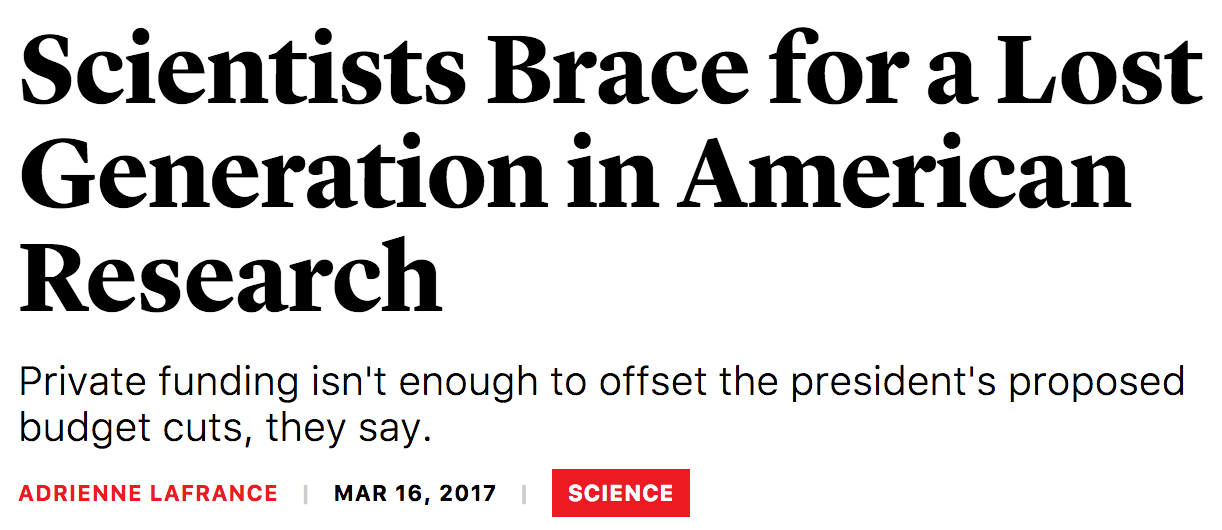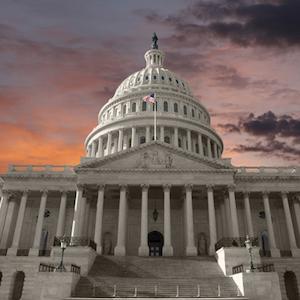On November 8, I published an article titled, "Whoever Wins On Election Day 2016, American Science Is Still #1 In The World." That is every bit as true now as it was then.
Mr. Trump promised to be a different kind of president. So, nobody should be surprised that he is living up to his campaign pledges. However, his budget proposal for 2018 should raise some serious concerns. Cutting science funding, particularly that of the NIH, is not aligned with his goal to "Make America Great Again."
How Bad Are the Proposed Cuts?
In many ways, Mr. Trump's goal of reducing the size and scope of the federal bureaucracy is laudable. But spending cuts require a laser, not a shotgun. According to an analysis by Ars Technica, the biggest science-related cuts would be to the NIH ($6.3 billion), Dept. of Energy ($1.7 billion), and the EPA ($2.6 billion). Combined, the cuts total nearly $11 billion.
Because the EPA has become an unwieldy leviathan, it is difficult to weep over its budget reduction, which Mr. Trump plans to slash by one-third. However, the planned reduction in the NIH budget is bizarre. Of all federal agencies, the NIH is one of the best. Why punish an organization that has a long track record of using tax dollars wisely with a massive 20% budget cut? That's fair and equal but not smart.
 Criticize, But Don't Catastrophize
Criticize, But Don't Catastrophize
It is proper for scientists to object to Mr. Trump's budget. But catastrophizing about it won't help. Headlines like this from The Atlantic (see image on right) are not justified. There will be no "lost generation" of American research for three reasons.
First, Mr. Trump's budget proposal is simply that: a proposal. Congress must approve the budget, and there are many supporters of the NIH in Congress who will not tolerate such a dramatic cut. Second, Mr. Trump will not be President forever. While budget cuts can do damage, they can be reversed. Besides, in 2016, the U.S. invested $514 billion in R&D, the lion's share (nearly two-thirds) of which came from industry. Third, American scientists are the best in the world, as measured by both science output and the number of Nobel Prize winners.
Regardless of who had won the Presidency -- Donald Trump, Hillary Clinton, or Scrooge McDuck -- those three facts would remain unchanged.
What I Would Do if I Was President Benevolent Dictator
The Atlantic is on more solid ground in the subheadline, which says private funding would not offset budget cuts. That certainly could be true because basic research is something many economists believe is a "public good," and as such, it is susceptible to the "free rider problem." Also, because basic research has no obvious or immediate financial payout, it would probably be underfunded. Since World War II, the government has intentionally sought to do nearly half of the country's basic research. The private sector will not suddenly do more of it when they have been used to taxpayers funding the risk.
Science done for science's sake is important, not just because knowledge is important, but because unexpected discoveries can lead to groundbreaking new technologies. Who could have predicted that a weird little microbe (Thermus aquaticus) found living in Yellowstone's hot springs would revolutionize molecular biology?
Thus, there is a legitimate role for government to play in funding R&D, with a bigger emphasis on the R1 and a smaller emphasis on the D2. If I could wave a magic wand, I would double NIH funding and enact policies aimed at rewarding the most innovative academic researchers, particularly younger scientists who are having an incredibly difficult time finding jobs in universities.
But I don't have a magic wand. And neither does Mr. Trump, which is why he should re-think his budget proposal.
Notes
(1) I was a former beneficiary of NIH grants that resulted in publications in Microbial Pathogenesis, Infection and Immunity, and the Proceedings of the National Academy of Sciences (PNAS).
(2) In my worldview, while government has a proper role in funding research, I believe funding development (e.g., commercialization) is more properly the role of the marketplace.




